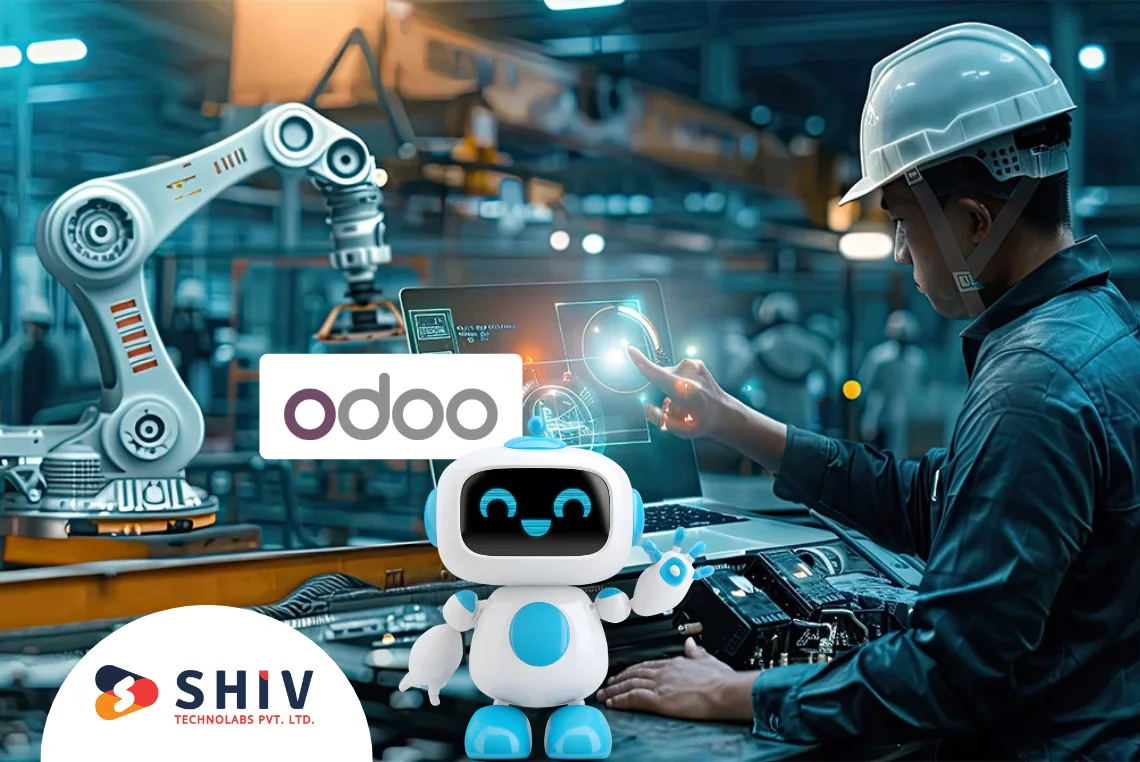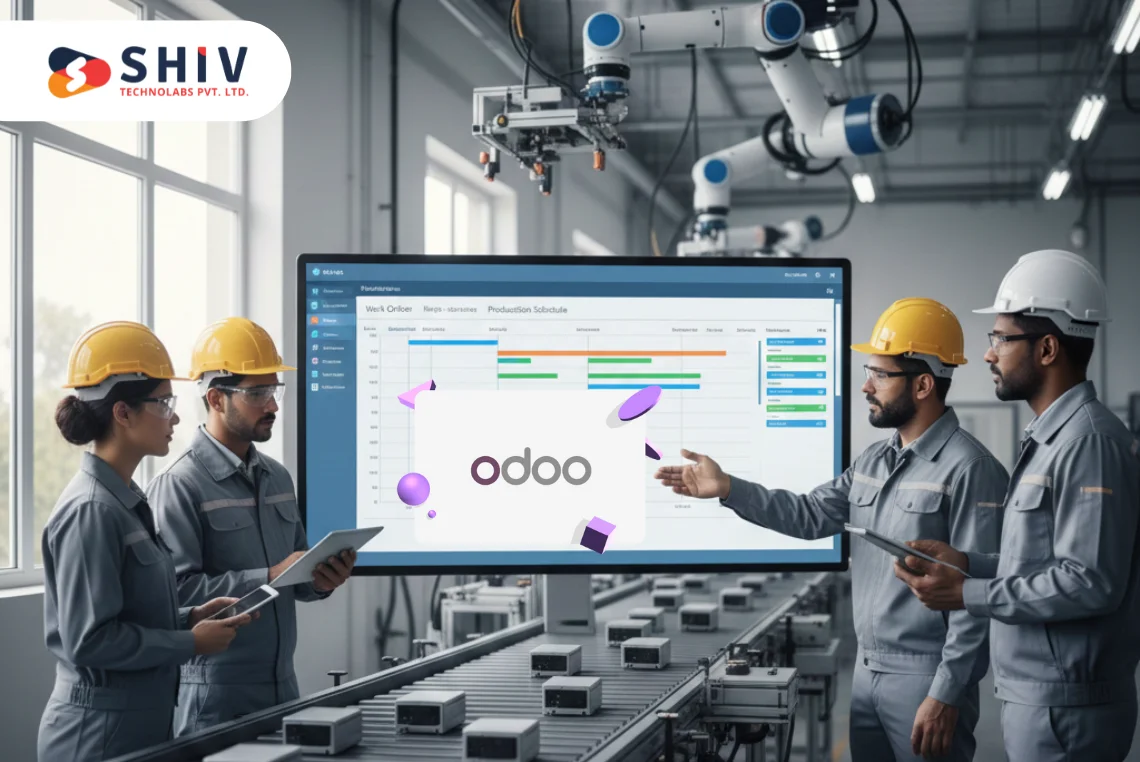Table of Contents
German manufacturing is moving from paper-based routines to connected, data-led plants across regions and supplier networks. Many producers work with certified Odoo Partner Germany teams to adopt an AI-ready ERP for production and data control. Rising costs, strict quality rules, and labor gaps push leaders toward practical upgrades that protect margins.
AI adds pattern recognition, early warnings, and trusted forecasts for orders, parts, and machine care. Combined with Odoo manufacturing ERP, teams view production, inventory, and equipment status from a single workspace. Plants cut downtime with predictive maintenance and raise yield through continuous checks at critical steps.
Procurement, warehousing, and logistics sync with live production events to keep materials moving on time. Planners compare KPIs by line or shift, then act early before small issues grow further. Teams meet German and EU standards with clear traceability, controlled changes, and auditable records everywhere.
The Odoo–AI pairing supports faster quoting, shorter changeovers, and consistent output across complex product mixes. Leaders gain reliable cost baselines, accurate delivery dates, and stable quality backed by shared data. German factories move from guesswork to repeatable results through AI in manufacturing, Germany, and Odoo-led workflows.
What Makes AI in Manufacturing Essential for German Industries?
German factories adopt Industry 4.0 to lift output and protect margins in highly competitive markets. AI in manufacturing Germany delivers real-time insight, smarter schedules, and tighter quality checks across every shift. Vendors connect machines, PLCs, and MES feeds to support smart factory solutions in Germany at scale.
Leaders need accurate data from sensors and lines to react quickly when demand or supply changes. AI flags anomalies, predicts maintenance windows, and guides teams with prioritised actions in plain dashboards. Plants keep throughput steady, cut stoppages, and release complex variants on time with fewer surprises.
Key benefits for manufacturers in Germany:
- Real-time production data tracking
- Reduced manual errors
- Predictive maintenance scheduling
- Improved energy efficiency
- Faster product design cycles
Traditional vs. AI-Driven Manufacturing
| Aspect | Traditional Production | AI-Driven Smart Operations |
|---|---|---|
| Data Management | Manual entry | Automated, real-time analytics |
| Maintenance | Reactive | Predictive and preventive |
| Production Planning | Static | Dynamic and data-driven |
| Quality Control | Sample-based | Continuous through AI inspection |
| Decision Making | Experience-based | Insight-based (AI models) |
These outcomes grow when AI runs beside Odoo manufacturing ERP in a single, connected workspace. Planning, quality, maintenance, and inventory share one version of the truth, so decisions happen faster and earlier. German factories gain higher uptime, stable quality, and clearer schedules without heavy changes to existing equipment.
How Does Odoo Manufacturing ERP Enable Smart Factory Solutions in Germany?

Odoo manufacturing ERP connects production, inventory, quality, and maintenance in one practical system built for plant speed. Teams track work orders, materials, and machine status in real time with clear role-based views. Data from PLCs, IoT sensors, and barcode stations lands on a single timeline for every shift.
Smart manufacturing with Odoo adds predictive maintenance, production forecasting, and adaptive scheduling to daily work. Models read demand signals, propose capacity moves, and flag at-risk parts before issues reach assembly. Planners review suggested changes, confirm the best option, and publish updates to buyers, operators, and supervisors. See planning depth in Odoo ERP: Production Planning & Scheduling.
Key Odoo features for German factories:
- AI-supported production planning
- Real-time equipment tracking
- Automated quality checks
- Smart inventory alerts
- IoT and sensor-based reporting
Odoo connects to common PLC protocols and shop-floor hardware using standard connectors and REST APIs – supported by Odoo development services. Vendors link MES, CAD, and label systems, so planners avoid double entry and keep master data consistent. Companies start with core modules, then add AI services as teams build confidence on each line.
The platform supports Industry 4.0 goals and German compliance needs through built-in traceability and controlled changes. Plants capture lot numbers, serials, inspection steps, and deviations with full audit logs across cells and sites. Standard reports help prepare CE files, supplier PPAP packs, and EU submissions such as VAT and Intrastat.
Consider an automotive supplier linking presses, vision cameras, and torque tools to Odoo work orders. If scrap trends rise, AI suggests a tool check, and schedules adjust to protect confirmed delivery dates. Warehouse teams receive timely reorder alerts, and buyers confirm supplier shipments ahead of the next shift.
These building blocks form a reliable base for smart factory solutions in Germany with Odoo at the core. Clear roles, measurable KPIs, and stable integrations let managers scale across plants without losing control. With priorities set and data flowing, leaders can begin ERP rollout in phases, starting with one high-impact area.
How to Implement Odoo ERP in German Manufacturing Companies?
Many plants run separate tools for planning, shop floor control, and reporting. That split slows decisions and hides basic truths about cost and output. Here is how to implement Odoo ERP in German manufacturing with clear steps and low risk. For expert help, see Odoo implementation services.
Step-by-step Odoo ERP implementation
- Assessment: Walk each line with supervisors. Map routings, order flow, scrap reasons, and delays. Set ten baseline metrics and freeze week-one data.
- Customization: Configure MRP, Quality, Maintenance, and Inventory to match shifts, approvals, and labeling rules. Load BOMs and routings with test records first.
- Integration: Link PLCs, sensors, label printers, MES, and CAD with stable APIs. Dry-run every feed and confirm units, timestamps, and item codes.
- Training: Coach planners, leads, and operators by role. Use short sessions on live orders, quick cards at stations, and brief video refreshers.
- Monitoring: Track uptime, scrap, cycle time, and schedule hit rate in Odoo dashboards. Hold a daily huddle, fix issues, and retest the same shift.
Begin with one product family on one line. Keep a tight goal, a fixed window, and a named owner for every task. Record results, tune settings, and only then extend to more cells, plants, or complex variants.
Data quality shapes outcomes, so treat cleansing and migration as a full workstream. Assign owners for master items, vendors, and routings, then lock the process before cutover. Meet EU and German rules by setting roles, audit trails, and hosting choices in the first project week.
Implementation timelines by factory size
| Business Type | Estimated Implementation Time | Key Focus Area |
|---|---|---|
| Small-scale factory | 2–3 months | Production setup, Inventory management |
| Medium manufacturer | 4–6 months | Automation, Supply chain sync |
| Large enterprise | 6–9 months | Multi-plant coordination, Predictive analytics |
Support people through change from day one. Supervisors run short floor briefings, confirm adoption at stations, and raise blockers early. Keep feedback loops tight so teams fix problems fast without slowing confirmed orders.
Most Odoo ERP implementations in Germany move faster with certified local partners. They bring sector templates, test packs, and audit-ready scripts that cut rework. That practical help shortens acceptance, lowers project strain, and gets value on the floor sooner.
What Are the Benefits of Odoo AI for Factory Automation in Germany?

AI with Odoo manufacturing ERP ties production, inventory, logistics, and quality into one clear view. Teams act on live shop-floor signals instead of chasing emails or scattered spreadsheets across shifts. The benefits of Odoo AI for factory automation in Germany appear first in uptime, yield, and reliable delivery dates.
Predictive maintenance spots wear and cycle drift early, so work pauses align with planned breaks. Operators receive clear prompts at stations, and planners adjust changeovers and batch sizes with confidence. Quality tools watch vision checks, torque results, and SPC trends, then flag issues before defects leave a cell.
Inventory and logistics follow actual takt, not static plans, so parts arrive in the right sequence. With Odoo ERP for industrial automation in Germany, dock slots, ASN scans, and labels feed one reliable timeline. Leaders see faster reviews, cleaner handoffs, fewer urgent calls, and steadier targets across busy product mixes.
Why German Manufacturers Prefer Odoo ERP for Smart Manufacturing?
German plants pick Odoo manufacturing ERP for clear control, lower risk, and fast wins on the floor. Teams start with core modules, then add planning, quality, and maintenance features as confidence grows. The system fits high-mix production, strict audits, and short lead times across regional supplier networks.
Odoo supports smart manufacturing with Odoo through open standards and rich integrations. Vendors connect MES, IoT sensors, and vision systems without heavy custom code or long outages. Planners, buyers, and operators read the same truth, so actions line up across shifts and sites.
Cost matters in competitive markets, and Odoo offers a lighter ownership model. Factories avoid oversized license bundles and pay for modules that match real needs. Leaders direct budget toward training, data cleanup, and line hardware that drives measurable results.
Compliance drives daily work in Germany. The platform records serials, lots, approvals, and changes with audit trails that stand up to reviews. Finance teams handle VAT and Intrastat with standard reports (see Germany e-invoicing & Odoo compliance), while quality teams attach proofs to each order.
Flexibility also wins support from plant managers and IT teams. Odoo adapts to varied routings, mixed batch sizes, and seasonal demand without major rework. When demand shifts, planners adjust capacity and materials with data that reflects the current state.
Community strength adds long-term value. Odoo’s ecosystem delivers connectors, best practices, and frequent updates tested across many sectors. That momentum keeps modules current and reduces the burden on internal teams over time.
Why German manufacturers choose Odoo
- Modular setup that fits any manufacturing scale
- Lower ownership cost than rigid legacy suites
- Localized features for VAT, Intrastat, and trade documents
- Strong integrations for MES, IoT, CAD, and labeling
- Active community and frequent product updates
- Available experts from the Odoo Partner Germany network for fast rollout and support
The result is a practical path to smart operations with less friction. Plants gain stable output, cleaner data, and faster decisions, backed by a system that grows with the business.
Conclusion
German factories are moving from manual routines to connected, data-led production across lines, plants, and suppliers. AI in manufacturing in Germany pairs with Odoo manufacturing ERP to raise uptime, quality, and planning accuracy.
This pairing gives leaders real-time visibility, clean handoffs, and quicker action when demand or supply shifts. Teams see orders, materials, and equipment health in one place, then act before small issues grow.
Connect with Shiv Technolabs, an experienced Odoo Development Company in Germany, for a free, plant-focused consultation this month. Get a practical review of scope, data, and timelines from experts who know local standards.
Request a demo from Shiv Technolabs to see AI scoring, maintenance signals, and planning suggestions on your own data. Start with one line, measure results for four weeks, then extend across products and sites.
FAQs
Q1. How does Odoo support AI in manufacturing for German companies?
Odoo links IoT data, predictive maintenance, and demand forecasts, giving German plants real-time control and clear decisions.
Q2. Is Odoo ERP suitable for small and medium manufacturers in Germany?
Yes, the modular design lets SMEs start with essentials and grow toward smart manufacturing with Odoo over time.
Q3. What is the typical timeline for Odoo ERP implementation in German factories?
Most implementations are completed within three to six months; scope, data migration, and training influence the final schedule.
Q4. How can Odoo help in industrial automation?
Odoo ERP for industrial automation in Germany connects machines, workflows, and analytics, guiding actions that improve output and quality.
Q5. Who should I contact for Odoo ERP setup in Germany?
Work with a certified Odoo Partner Germany to align scope, meet local rules, and integrate AI-driven modules.






















